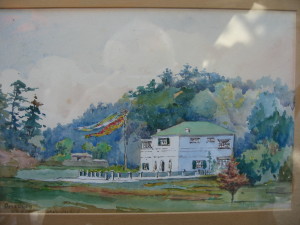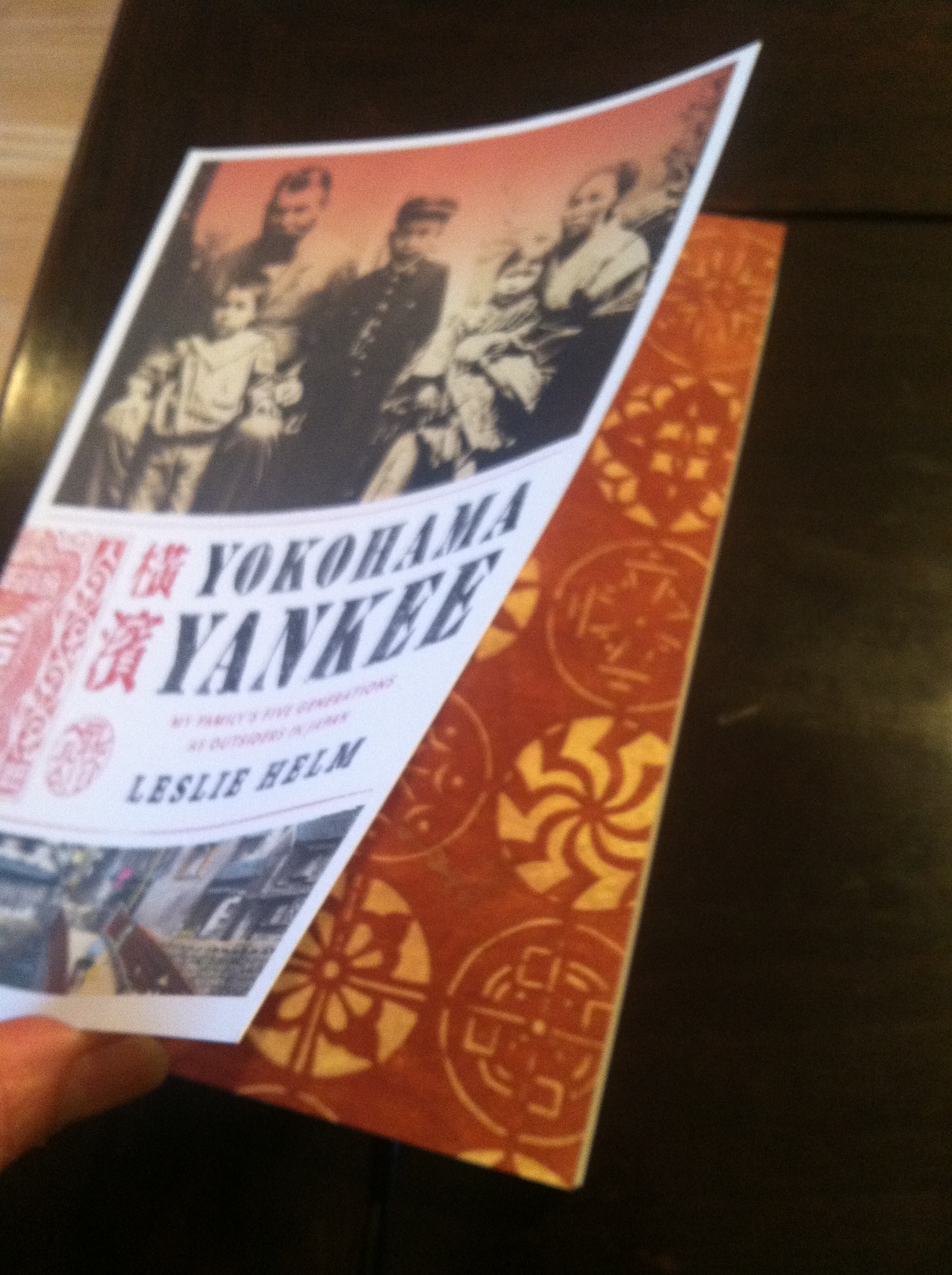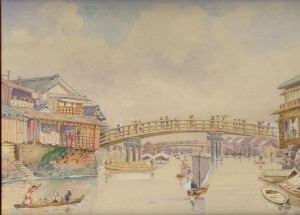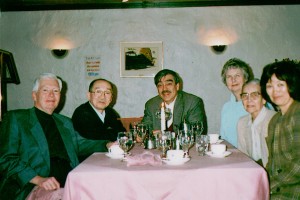 A few months ago, soon after I posted about CB Bernard here, and about his wonderful scenes of early Japan, I received the following email from Julian Bernard in Canada, a distant relative of my second cousin Bertie. Bertie had been my teacher in high school at Y.I.S. and had taught me an early love for history. I had always been fascinated by his British accent, and until I researched Yokohama Yankee, never really understood how we were related. (His maternal grandfather and my paternal grandfather were brothers.) So I was thrilled when I received this message from his cousin giving me insight into the paternal, British side of his family.
A few months ago, soon after I posted about CB Bernard here, and about his wonderful scenes of early Japan, I received the following email from Julian Bernard in Canada, a distant relative of my second cousin Bertie. Bertie had been my teacher in high school at Y.I.S. and had taught me an early love for history. I had always been fascinated by his British accent, and until I researched Yokohama Yankee, never really understood how we were related. (His maternal grandfather and my paternal grandfather were brothers.) So I was thrilled when I received this message from his cousin giving me insight into the paternal, British side of his family.
“My heart skipped a beat, or even two, when I came across “A Grandfather’s Love”. Charles Burton Bernard, was my grandfather. I met him only once, in 1939, just before he set sail from Vancouver for Yokohama on the final stage of what must have been his last trip outside Japan. To this day I cherish a number of his drawings and watercolours including four pen and ink drawings which he sent to me, four successive Christmas gifts, from 1936 to 1939…I have no wish to intrude on the Helm family or its Bernard links but I could not resist the urge to tell you how moved I was by your vignette of CBB.”
That email began my long correspondence with Julian who had spent 30 years with the Business Development Bank of Canada and married Ann, whose father had spent a year and a half in Japan working for Nipponophone, the Japanese subsidiary of EMI, a British recording company. (He wrote a delightful diary of his experiences in Japan that will be the subject of a separate post.) From Julian I learned so much about the Bernard family’s life in Yokohama and how much the family’s experience mirrored those of my own family. Julian found Yokohama Yankee “intensely interesting but also rewarding,” he said because “It helped me realize that my father’s discomfort with his heritage was not just his but was shared with many others with the same or similar backgrounds.” Julian explained in more detail in a following email:
“George, my father, always told us that he was born in Kingsbridge, Devon and that his mother died when he was young. That was his story and he stuck to it. Dad was in the Royal Navy in WW1 and in the Canadian Navy in WW2 during which he was commanding officer of the Toronto naval station and later of a base on the east coast; it seems safe to assume the navy had no idea he was half Japanese. CBB didn’t let the cat out of the bag when he visited us in 1939. I do remember CBB’s arrival from Montreal at Union Station in Toronto. I was with my father on the platform, the train arrived, the doors opened, and down stepped a slight, dapper, white haired man with a white goatee wearing a grey three piece suit. My father said “good afternoon, sir” and the thought flashed through my mind – he called his dad ‘sir’. In retrospect, I believe it reflected both distance, and respect. Another incident occurred around 1962/63. Ann and I were at my parents for Sunday dinner. The phone rang and Dad went off to answer it. The conversation was brief and Dad returned to the table. Someone asked who it was and he replied that it was his nephew, Bertie, who was at Queen’s University in Kingston (mid-way between Toronto and Montreal) for a term and that he would like to visit us. Of course we all asked when Bertie was coming and Dad’s response was “I told him I didn’t want to see him”. When we asked why not, Dad stormed upstairs and we didn’t see him again that day. Obviously, we had hit a sore spot. That incident got me thinking back to my teens when I wore thick, bottle bottom, glasses. It happened no more than two or three times but, when I removed my glasses, I had been asked if I had any Asian blood in me. There was something about my eyes. Of course I denied it because that was what I had been told but, after the phone call incident, I really began to wonder.
“Only a few days after my father died in 1982, Mother came across Dad’s passport, opened it, and found his birthplace recorded as Yokohama. They had been married for 54 years and he had never told her! Within a few weeks Ann and I were in Erieville, NY where cousin Tony was then living and the whole story came tumbling forth; it was the start of my quest to meet as many as possible of my long hidden cousins and to try to understand why the truth had so long been denied.
CBB’s first marriage, to Ura Iida, ended in rancour and it seems inevitable that the collapse of the relationship affected the children. The story goes that CBB’s partner in the tea business, a man named Down, swindled CBB while CBB was away on one of his frequent trips to England and/or the USA. Down and Ura had Power of Attorney and, when CBB returned, the business was gone.”
It’s unclear whether CBB’s first wife, Ura, had anything to do with CBB being swindled, Julian later explained. In any case, CBB divorced his wife Ura. After the divorce, Ura’s brother threatened CBB. Apparently CBB felt the threat was a serious one because he began carrying a gun on his person, something that was very rare in Japan in the early 1900s.
CBB took over the care of the children, and, as was the custom among British expatriates, sent them to Britain for their education. Explains Julian: “Of CBB and Ura’s five children, [eldest son] Charles (CEBB) was sent off to England in 1904, when he was 12, to be cared for by CBB’s sisters, Blanche and Grace. John and George were shipped off early in 1909 at the ages of 11 and 9 respectively while the two girls, Amy and Ciss (Cecile) followed later in 1909 at the ages of 13 and 9 respectively. Despite the business setbacks, CBB was seemingly still quite well off at the time and governesses, nurses/amahs were employed; judging from a few surviving photos, most of them were English but there was at least one Eurasian…. CBB paid for the children’s first class passages back to England, their upkeep and their public (in the British sense of that word) education.”
The children must have faced a great deal of discrimination in England. Says Julian: “All were unhappy there, probably because they were “different” and four left England when they could – two to Canada, one to Boston and one to Argentina. Amy remained in England but then had the misfortune to marry a brute of an army man who never stopped berating her for her ancestry. Amy’s sole surviving child, now an elderly widow in Scotland, cannot get her head around any of this and continues to refer to Bertie as “the mysterious Japanese cousin”. [Amy’s extensive collection of papers and photographs, Julian later wrote, were edited to remove photographs of Ura, her Japanese mother.]
The grandchildren of that side of the family showed little interest in their Japanese heritage. “Once CBB’s five children of his marriage to Ura Iida left Japan, none ever returned. There were 9 grandchildren and I was the only one to visit the country,” says Julian.
But the fourth generation is now showing interest. Julian’s youngest son, Chris has visited Japan. Brigid, a great-granddaughter of CBB is apparently planning to study in Japan. Last night I had sushi with Amy Bernard, another grandaughter who represents the Boston side of the family. Her father and grandfather, like her great-grandfather CBB, were both artists. Amy works as a scientist at the Paul Allen Brain Institute in Seattle, just a few miles from where I live. She is one eighth Japanese, and with red hair and fair skin, shows little trace of her Japanese heritage. But she loves Japanese food and is interested in exploring her Japanese roots. She says she will find a way to go to Japan soon. She showed me a photo album she inherited with many charming pictures of CBB’s life in Yokohama.
Every new bit of information I learn about my family help me better understand what my family went through. The Bernard’s experience showed that my family’s experience of trying to hide our mixed race background was hardly unusual. And making those connections allow me to experience the joy of seeing how the fourth generation of the Bernard family is was once again embracing Japan. We owe so much to people like Julian, who spend a lifetime digging into their family histories to uncover a past that tells us more about who we are.
Below is a picture of Julian Bernard at left, with my cousin Bertie Bernard at center, Julian’s wife next to Bertie, Lillian, Bertie’s mother (who helped me so much with my book), and Kyoko, Bertie’s charming and brilliant wife. The Japanese gentleman between Julian and Bertie is Kyoko’s brother.


